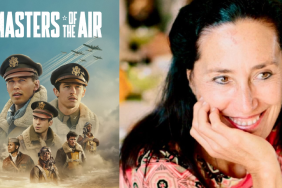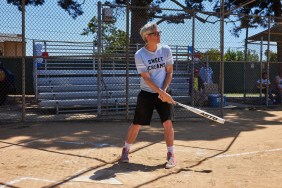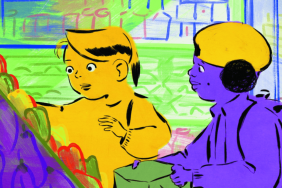Time has really done well by Mark Duplass even if it’s also his most valuable commodity, because he is literally one of the busiest guys in Hollywood this month, appearing in three movies and having two movies he co-directed with his brother Jay showing up in a variety of formats.
For many years, Mark was known as one half of the Duplass Brothers, indie mainstays whose movies got a lot of attention on the festival circuit, and they’ve been extremely busy in recent years. Their first movie of 2012 Jeff, Who Lives at Home just came out on DVD and Blu-ray, while their second movie of 2012, The Do-Deca-Pentathlon, is out later this month. Oddly both movies deal with brotherly conflicts with the latter involving a competition between two estranged siblings they decide to revive nearly twenty years later.
In between directing those movies, Mark has been working with other filmmakers both as a producer and actor, most notably in Lynn Shelton’s Your Sister’s Sister, which teams him with Emily Blunt and Rosemarie Dewitt for another decidedly different love triangle comedy and Colin Trevorrow’s Safety Not Guaranteed, in which he plays Kenneth, a store clerk building a time machine and trying to find someone to travel back in time with him, which he finds in Aubrey Plaza. (We spoke with director Lynn Shelton and Duplass’ co-stars Emily Blunt and Rosemarie Dewitt in an earlier interview and you can read our interview with “Safety” director Colin Trevorrow and co-star Jake Johnson here.)
In the last few years, Duplass has also become a fairly busy, in-demand actor working with the likes of Noah Baumbach and Oscar winner Kathryn Bigelow–he also has a small role as Elizabeth Banks’ neighbor in Alex Kurtzman’s People Like Us–and if that wasn’t enough, Mark and his wife and fellow filmmaker Katie Aselton star on the FX sitcom “The League,” which will soon start filming its fourth season.
We’re actually kind of surprised Mark had any time to talk with us but having touched base with him a number of times over the past four years, ComingSoon.net got on the phone with him recently to catch-up and talk about all the above.
ComingSoon.net: You have so many movies this month, you’re almost like the indie Samuel Jackson.
Mark Duplass: (laughs) Can I please use that on my resumé?
CS: Absolutely, you should. I’ve seen most of these movies over the last nine months at various festivals – “Your Sister’s Sister” at Toronto and “Safety” at Sundance and then I just saw “People Like Us” yesterday, not even realizing you were in it. I’m sure these were all made over the course of the last year, but let’s talk about “Your Sister’s Sister” first. You’d worked with Lynn before, so had she already been pitching you on this idea when you were doing press for “Humpday”?
Duplass: It felt like “Humpday” was already done and gone by the time we talked about “Your Sister’s Sister.” It was actually a movie idea that I had for a while that I thought Jay and I probably would never make, so I called Lynn and pitched her the basic concept of the movie and she got excited by it, and then we decided to take the same approach to making the movie as we did for “Humpday” which was just shoot fast and furious and get it done quickly. We brought in Emily Blunt and then it felt like we were shooting three months later.
CS: I spoke with Lynn and Rosemarie and Emily about six weeks back and I seem to remember them all saying nice things about you.
Duplass: I’d love to hear those things.
CS: They all said it was a great experience because you worked with Lynn before and made it easier for them to get into it. Was this approach similar to “Humpay”? If I remember, there wasn’t a script but you did a lot of workshopping, is that right?
Duplass: Yeah, there’s no script. There’s a treatment that we work from, but things change on set in terms of the plotting. All the dialogue you see is improvised which she shoots with multiple cameras to try to make sure when you get the moment, you have it well-covered. We only had I think it was ten or eleven days to shoot the movie so we were moving quickly, but these smaller movies are designed to be shot cheaply and quickly so it didn’t feel like we were rushing too badly, and it’s just a great organic process. You really felt this other performance and the inter-personal dynamics and that was our attempt to make a love triangle movie feel fresh and new.
CS: It feels like it has bigger production values than “Humpday” and I’m not sure if that’s just the location.
Duplass: I think it’s the location and our cameras are more expensive and then there are two really gorgeous faces in the form of Rose and Emily this time, and they’re extremely beautiful to shoot.

CS: That wasn’t the same location where Katie (Aselton, Mark’s wife) shot “Black Rock” is it?
Duplass: No, those places are about 4,000 miles apart. They’re each on separate coasts but I think that the deep Maine woods shares some similarities to the Pacific Northwest.
CS: Was this a very different experience from “Humpday” and did Lynn feel any pressure because of how well that movie was received?
Duplass: Actually, Lynn felt pressure, a lot, because yeah, it was her second movie that people were really going to see, and it’s that sophomore effort pressure even though she had one more movie produced, but this was going to be the most public sophomore effort. But I didn’t feel any pressure while I was there. When you’re making these kinds of movies, the hope is that it turns out good, but we’re making them so cheaply, that you know, if it doesn’t hit, nobody’s going to go bankrupt. It’s not “John Carter,” so that to me takes the pressure off. We’re experimenting out here. We’re trying to find something that can connect with audiences and we’re going for it. If we get there, awesome. We’ll take it to a film festival and someone will buy it, that’ll be great, but if not, big whoop. We spent ten days, we took our shot and we missed, then okay, no big deal. I think that sort of attitude allows you to take big swings and not be afraid to miss.
CS: Like with “Humpday,” the performances in this one and I’m not sure if that’s just because Lynn can shoot more than normal and she has a good eye for keeping the best stuff from the performances?
Duplass: I’ll say this. Let’s say you’re trying to purvey a certain element or a certain emotion. If you’re locked to the words on the script, as good as those scripted words are, if you didn’t have the time to rehearse them correctly or if the perceived dynamic between the actors is different from what the writer imagined, and you’re not allowed to stray from that, you’re going to have a stilted scene. So when scripted dialogue works, there’s nothing like it, but it’s much easier to make improvised work when you’re shooting quickly because if it’s not working, all you do is change it, and you change it right there in the moment based on your instinct. To me, when you’re shooting quickly like on these films, you have a much better chance of success when the dialogue is yours to form fit into the existing situation.
CS: You and Jay have gotten that down to a science, so do you find when you’re acting in other people’s movies, you can bring some of that to the table? I understand “Safety Not Guaranteed” was pretty well scripted before you started shooting.
Duplass: Yeah, you know, the thing is that it’s hard to understand the type of improvisation we’re employing. Most people think of improv and they think of riffing so that you can get jokes, which is not what we’re doing. We’re allowing aberration in the dialogue, which is the case in my movies, so that you can fit more closely into your character, so it’s not extra things we’re improvising. It’s just slightly changing the dialogue that’s on the page to make it feel more comfortable, and that is the case with “Safety” and that’s the case with most movies I work on. That said, I worked on “Greenberg” with Noah Baumbach, and he really wanted his dialogue exactly like it was said. We did most of the takes that way and then we would do a couple at the end where we loosened them up and he used bits of both. I like doing all parts improvised but I do believe that if you’re really going to stick to the script word for word, it does require more character preparation and you owe yourself that time to do that.
CS: By working that way, is it harder for actors to separate themselves from the characters in some ways? Someone like Emily has obviously played a lot of different characters
Duplass: No, I think what happens is that your rhythms and your speech cadences of your real person start to come out when you’re deep in an improv to a certain degree. Like Emily Blunt in “Your Sister’s Sister,” she talks like that. Her character and who she is are completely different. Emily is a very emotionally-evolved self-aware person; her character in the movie is scared to talk to her best friend about her feelings. Emily is not like that. But the way that she talks and the rhythms, those are very much Emily and I’d venture to say that they’re very much me and very much Rose, but we’ve made character choices and life choices that are very different from us personally.
CS: I actually saw “Five-Year Engagement” probably around the same time that I talked with Emily for this and what she learned from doing this movie definitely carried over into that one
Duplass: Yeah, well Nick and Jason like improvisation too, so that’s a nice fit.

CS: Did Lynn come to you when she was thinking of casting Emily? Were you involved in that decision?
Duplass: Yeah, I sort of called Lynn with the idea first and she really wanted to do it, which is great, and then we discussed who would play Iris first. It was Lynn’s idea to get Emily Blunt and she didn’t really have to woo her because Lynn is the hardest person in the world to say no to, and it worked. And initially, there was another actress attached to the movie for a while, and then she dropped out and we brought in Rose, actually at the last minute before we started shooting.
CS: I remember they mentioned that and I was really amazed by that.
Duplass: Yeah, Rose is very special and she jumped right into it.
CS: I assume you shot this before “Safety.”
Duplass: Yes, that is correct. We shot this in October of 2010 and “Safety” was in April or May of 2011.
CS: So Colin came to you and Jay to produce that movie, so how did you transition into playing Kenneth? Did you pitch that idea to him?
Duplass: It happened kind of organically honestly. Jake (Johnson) and Aubrey (Plaza) were attached and we started thinking who could play Kenneth and we simultaneously agreed that he shouldn’t be played too quirky, he should be pretty grounded and we should feel his humanity, and then our whole approach is “make a movie with what you got; don’t try to make a movie with what you don’t have.” And we had me at that point (laughs), and it was very clear that I could do that kind of thing well. Being a producer on the project, I could be creatively trusted obviously, and Colin and I agreed, so it was just like, “Yeah, let’s do this. We got this going and it gives us momentum, let’s do it.”
CS: You have a lot of great scenes with Aubrey and from what I understand, that was shot very early on.
Duplass: Yeah, we did. I only had two weeks, so we did all of my stuff combined in two weeks, and a lot of the first stuff with just me and Aubrey.
CS: I’m always intrigued by the fact that you don’t ever act in the movies you direct with Jay. I was curious about that plus also how it was producing a movie while acting in it?
Duplass: Producing is fine. My producing partner Stephanie Langhoff runs the set while we’re shooting. It’s not like I’m cracking the whip while we’re shooting. I’m an executive producer on the movie in that my strengths are setting up the feel and scope of the movie, setting the budget, setting the tones, setting where we’re going to shoot it, doing all the bones to get it made and kind of grandfathering it, but then once it comes down to run the actual show, I’m not so good at that and my partner Stephanie is great at it. She did that portion. It’s not difficult and then in terms of me not acting in stuff that Jay and I direct, that’s always been more of a random question of logistics more than anything else. I’ve never been the right age for a lot of the characters or we decided, “Hey, we need a big movie star on this one so we can get the money to make it right.” I’m sure I’ll end up popping up in one of those at some point in time.
CS: I’ve also seen “The Do-Deca-Pentathlon,” which I think you first mentioned when we talked for “Baghead,” which was like four years ago.
Duplass: Oh, yeah, yeah.
CS: So was that something you shot back then but just recently finished?
Duplass: We did. We shot it in 2008 and then while we were editing it, we got our greenlight for “Cyrus” and that was the first big paycheck we’ve ever made, so we had to put it down and then while we were editing “Cyrus,” we got our greenlight for “Jeff, Who Lives at Home.” So “Do-Deca” was this poor little guy who just got stuck on the shelf while we were doing our big boy movies and then as soon as we finished “Jeff,” we just hustled back, picked it back up and finished it. And it’s great, man. It kind of represents the third movie in an unofficial trilogy with “Puffy Chair,” “Baghead” and the “Do-Deca-Pentathlon” that represents a time in our lives when we were just running around like idiots with our friends making movies for cheap. There’s something about the film that’s very unique in that in many ways, it has the bones of a big broad comedy but it’s made on a shoestring budget. I’ve never seen anything like it, and I’m really proud of it.

CS: I really liked it a lot. It reminded me of the earlier movies you guys did but it seems like you brought some of the sensibilities you gained making these bigger budget movie to that. I don’t know how the movie would have been if finished in 2008, but I think it became a much stronger movie by waiting.
Duplass: It might have benefited from us having edited two other features in the process – I definitely would agree with that.
CS: You’ve been working so much as an actor lately, too. We’ve spoken so many times over the years and I finally got around to seeing “The League,” which to me, is shocking you have time to shoot a regular television show amidst everything else. I’m surprised you have time to do so much stuff.
Duplass: It seems a lot but “Your Sister’s Sister” we shot in eleven days, I was in and out of “Safety Not Guaranteed” in twelve days. I’m working on a TV show, but it only shoots three months out of the year, so I’m constantly working steadily, but I’m not pulling eighteen-hour days and not sleeping. I have a family and I spend time with my family. I don’t know. I think it looks like I’m constantly working but it doesn’t feel that way to me for whatever reason.
CS: Oh, that’s right. You and Katie also had a baby recently. Congratulations on that!
Duplass: Thank you!
CS: I know you’re doing the Kathryn Bigelow movie, and I’m guessing there’s a lot of stuff you can’t talk about it, but can you talk about the experience? Because it’s probably a bigger role for you and probably more serious and dramatic.
Duplass: I was really excited to work with Kathryn because I’d never explored that side as myself as an actor, working on different projects, and I’m looking to do a lot more of that. Right now I’m looking for a really fun interesting different role for me for the beginning of next year, because I think for a while I’ve been squeezing in acting projects when I can, and I’m thinking next year of making it a little more of a priority because I’m really enjoying acting right now.
CS: Are you and Jay still developing movies to direct next?
Duplass: Oh, yeah. We’re writing a bunch of things right now and I think first and foremost my writing and directing partnership with Jay is who I am, but yeah, we have made quite a few movies recently, so I’m not sure we’re going to direct a movie next year. We might spend some time writing and building up that stockpile of scripts that allows us to make movies so quickly over the last five years.
CS: I spoke to Greta Gerwig a couple weeks back and it’s interesting how the world has started catching up to what you were all doing four or five years ago. Lena Dunham’s “Girls” is a really big hit on HBO right now, so have you noticed while doing this work that the world seems more open to the style of filmmaking you do?
Duplass: You know, it’s hard to say. I don’t really think in those terms. I think in many ways, that you guys are part of it. It’s hard to define for me, because I actually think that Lena is quite a different filmmaker than we are to a large degree, so what I will say is that I think that Lena, I think that Greta, are extremely talented, and I watch everything that those girls do, so I couldn’t be prouder or happier for them, and I hope that we all get to keep playing in the sandbox for a little while longer until they kick us out.
CS: Are there any new filmmakers you’re working with or producing who might be the next great indie filmmakers to come out of Sundance?
Duplass: There are honestly a ton of them and that’s part of our producing business right now is farming a lot of these younger filmmakers and developing scripts with them to work on, and I’d say we had about ten projects in development, but there’s a guy named Patrick Kack-Brice, who is a young filmmaker, who did a short documentary called “Maurice” that’s been around the festival circuit and he and I have a little super-secret projects in the works at the moment that I’m very excited about.
CS: I noticed that Ross Partridge (one of the stars of “Baghead”) was more involved with “Do-Deca” as a producer and assistant director, so is he doing more stuff with you guys?
Duplass: Absolutely. Actually, I have a project in development with Ross, and Ross is a great actor but he’s also a fantastic writer, so you’ll be seeing something emerging from him pretty soon. He’s always around; we love Ross.
CS: So next up for you is more on “The League”?
Duplass: We head back in August to do our fourth season of “The League,” which is crazy–I can’t believe that’s already happening, and I’m writing something for Todd Phillips right now–we’re adapting this book called “Mule” that he wants to direct, which is a great book about a young couple who gets hit by the economic crisis who takes a job muling pot across the country to get by. It’s very funny until it’s not funny at all, and if he chooses to direct this, which I hope he does, it will be a different kind of bearing for him, so we’re doing all kinds of things.
Safety Not Guaranteed and Your Sister’s Sister are now playing in select cities. The Do-Deca-Pentathlon opens on July 6, but can be seen on VOD starting June 26, while People Like Us (in which Mark has a small part) opens nationwide on June 29. Jeff, Who Lives at Home is out now on DVD and Blu-ray, and it’s not too hard to find “The League” on DVD, Blu-ray and Netflix Instant if you know where to look.
(Photo credit: FayesVision/WENN.com)









